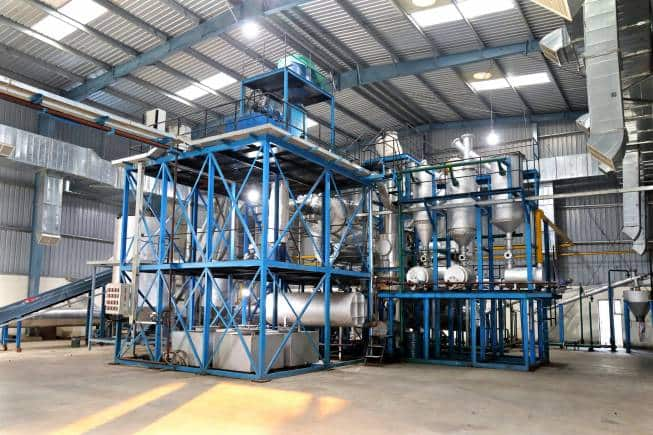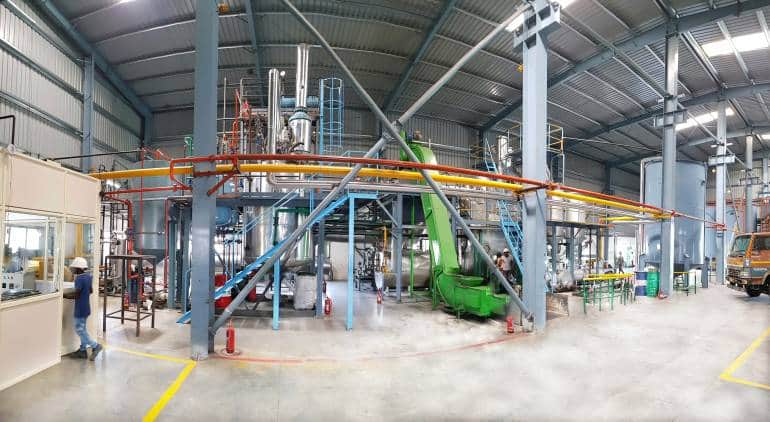



The plastic we use unthinkingly every single day, the plastic we throw away without a moment’s thought, lives on, killing our planet, sea life, and, slowly but surely, killing us. World generates around 300 million tonnes of non-recyclable plastic waste every year. Around 80 per cent of this plastic waste ends up in landfills, rivers, ocean and incineration. Now imagine if all that plastic could be recycled into something more sustainable? That’s exactly what Suhas Dixit’s APChemi is doing. The chemist from ICT, Mumbai, and Indian Institute of Management Ahmedabad (IIMA) alumnus has been turning waste plastic into fuel through a process called pyrolysis.
How pyrolysis works
Pyrolysis, itself means, fire or heat breakdown. “Pyro” is Greek for fire and “lysis” means to break down. “Pyrolysis, essentially, is the decomposition of larger molecules into smaller ones using heat. In the context of plastic, we use high temperatures to break down plastic molecules into smaller molecules of oil, gas, and carbon. The process, also known as thermal cracking or depolymerisation, offers a sustainable way to deal with plastic waste,” explains Suhas Dixit. The technology is designed to handle not just a wide range of plastics but also tyre and biomass. Purified pyrolysis oil can be used as aviation fuel, circular plastics and sustainable chemicals.
But the process is not as simple as feeding a reactor with tonnes of plastic waste and expecting a stream of oil from the other end. Buying or collecting plastic waste from municipal corporation recovery facilities and then readying it for pyrolysis is a time and labour intensive task. The waste is first shredded, then thoroughly dried. Dried plastic waste is then cleaned of dirt or debris and metal before it’s fed into a pyrolysis reactor. The oil that is produced from the plastic waste is dark in colour and needs to be purified before it can be used as crude oil naphtha substitute. APChemi uses a patented oil purification technology to remove contaminants from pyrolysis oil to produce PUROIL™, a high-quality oil from mixed end-of-life plastic waste. This oil can be used by petrochemical industries to reduce their dependence on crude oil naphtha to produce polymers and chemicals. The output from plastic waste to oil is 55-85 per cent depending on the quality of plastic waste.
But why turn plastic into oil? It has been found that less than 10 per cent of plastic waste is recycled each year. The remaining 90 per cent riddles our landfills, environment or it is burned in incineration plants. According to specialists, it would take more than 450 years to biodegrade, if it ever did. “Annually, millions of tons of plastic waste end up polluting our environment and additionally we end up consuming vast amounts of crude oil for new plastic production. We transform this end-of-life plastic waste into high-quality pyrolysis oil, reducing our reliance on crude oil and shrinking the carbon footprint of plastic waste management by 50 to 70 percent when compared to incineration or plastic landfill fires,” explains Dixit.
 A Pyrolysis plant.
A Pyrolysis plant.
How it all started
As a student of chemistry at ICT Mumbai, pyrolysis was always a matter of curiosity for Dixit. “Though it was never a part of my syllabus I was experimenting with burning plastic in glass wares and trying to make oil out of it. In the bargain, I ended up breaking too many glass wares in my university laboratory,” says Dixit, who finally leaped into the field of pyrolysis in 2007, after a university degree and a stint in the pharmaceutical industry. As a pilot project he constructed a small, mobile pyrolysis plant and carried it in his Maruti 800 to municipal exhibitions. Initially he received small orders of 5-10 litre plastic oil production pilot plants. Since its establishment in 2007, APChemi has set up 47 pyrolysis plants in India, Europe, the UK, West Asia and Africa and processed 179 million kg of plastic waste. APChemi also received a grant from ACT, a non-profit venture philanthropy platform.
Countries like Japan, Germany and the US have already implemented the plastic to fuel conversion process with much success. These three have also been successful in creating business models out of the conversion process. According to Dixit, though Asia is the centre of plastic waste crisis, 95 per cent of investments to solve plastic problem is happening in America. The rest 5 per cent goes to Europe.
The pyrolysis business has developed and grown during the past 10 years. International businesses like Continental, Michelin, Bridgeton, BASF, and others have also made investments and joined the pyrolysis market.
Is pyrolysis a profitable business?
 A pyrolysis and distillation plant.
A pyrolysis and distillation plant.
The main product of pyrolysis, the pyrolysis oil, is used in iron factory, power plants, cement factory, restaurant, etc. “Purified pyrolysis oil is far more superior than crude oil and is priced 30-40 per cent higher than crude oil. Also plastic produced from crude oil sells at the market price for plastic. But plastic from purified pyrolysis oil sells at 50 per cent higher rate than the market price of plastic because it is circular plastic. In Europe, the law mandates that 55 per cent of food and pharma packaging should contain chemically recycled food grade plastic. So, the demand for pyrolysis purified oil is high and is only going to get stronger in the near future,” says Dixit. According to industry experts, pyrolysis alone is projected to generate profits of $25.4 billion by 2030, while the entire pyrolysis based chemical recycling market is expected to reach $100 billion by 2030.
Currently, APChemi is working on building a 50 tonnes per day plastic to oil plant near Mumbai. Another 250 tonnes plastic to oil plant in Morocco is also in the pipeline.
Note to Readers: Germ of an Idea is a series about the entrepreneurial idea—how it was conceived, shaped and launched, detailing the early days filled with uncertainty and apprehension, the bold steps taken and the eventual success. The series hopes to inspire thousands of potential Indian entrepreneurs who are on the cusp of starting up or have ventured recently or are in schools and colleges dreaming of turning founders.
Discover the latest Business News, Sensex, and Nifty updates. Obtain Personal Finance insights, tax queries, and expert opinions on Moneycontrol or download the Moneycontrol App to stay updated!
Find the best of Al News in one place, specially curated for you every weekend.
Stay on top of the latest tech trends and biggest startup news.